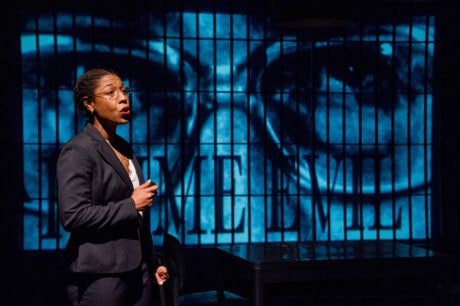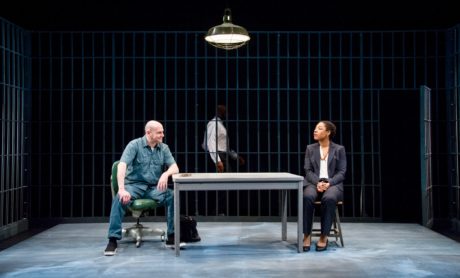A Human Being Died That Night is set inside a penitentiary in South Africa. Gray bars, gray floors, gray walls, gray everything. A black woman and a white man are seated at opposite ends of a table, she in a tasteful suit, he in an orange prison uniform.

She is a psychologist. She is there to interview a convicted killer of black people. He acted as an agent of the apartheid state. His crimes are heinous. Headlines have called him “Prime Evil.”
At a point the man leans forward in his chair, hanging his head as if in remorse, and lowers his handcuffed wrists into his lap. In a sudden, subtle, and stunning movement, the woman assumes the same position, her wrists at rest in her lap like his, as if in empathy. Her mirroring movement comes too quick to seem calculated; it looks genuine, almost involuntary. And in the eloquence of their shared body language, the possibility of forgiveness and reconciliation—huge, lofty concepts at the core of this play—becomes as palpable as a pulse.
The play A Human Being Died That Night is tightly adapted by British dramatist Nicholas Wright from an award-winning, best-selling 2003 book of the same name by South African clinical psychologist and research professor Pumla Gobodo-Madikizela, who based it on her prison interviews with the infamous Eugene de Kock. A former South African commanding officer, he kidnapped, tortured, and murdered black anti-apartheid activists and was sentenced to two life sentences plus. Gobodo-Madikizela’s subtitle is A South African Story of Forgiveness—which might sound like a stretch till you see this play.
Pumla is a character in it, a lecturer on issues of forgiveness and reconciliation. She begins the play as if she has come to deliver a speech to us, and she gets to the moral heart of the matter straightaway:
What should our attitude be to people who have committed atrocities? Our tendency, always, is to think of them as monsters who are radically different from ourselves. We fear that, if we engage with them as real people, we will be lowering the moral requirements for entry into the human community. There is another reason too. It is our fear of discovering that the perpetrators are as human as they are.
Behind Pumla is Set Designer Debra Booth’s stark cold prison space; and seen on a screen through bars are Projections Designer Patrick Lord’s documentary stills of political violence, including the crimes of de Kock. The play’s setting and historical backdrop are unmitigatedly grim.
But Erica Chamblee as Pumla is a poised professional who knows to keep a specialist’s detachment from her research subjects, and that emotional reserve of hers serves the mediating purpose of being a buffer for us too against the horror. Then as the play unfolds, we witness her feeling floods of emotion she was trying to keep in check. And we too let down our guard. Chamblee’s is an awesomely measured performance of a person attempting what seems impossible in these horrific circumstances: to understand and forgive. In a sense A Human Being Died That Night is a parable for grownups that models its edifying moral in the character arc of Pumla. Except it’s not a made-up fable; it really happened.
A Guard (Jason B. McIntosh) leads in a prisoner in chains then leaves, locking the two inside. As Eugene de Kock, Chris Genebach portrays someone more personable and good-natured than either we or Pumla might have expected. Still there is something creepy here.
EUGENE: Tell me, does this, this set-up that you’re looking at now make you think of a certain film?
[Pause]
With Jodie Foster and Sir Anthony Hopkins?
PUMLA: Yes, I must admit that it reminded me of that.
Cue the nervous laughter.
Much of Wright’s script relates violent instances in South African history that de Kock had a bloody hand in. Especially poignant was the aftermath of his role in the so-called Motherwell bombing, in which three black police officers were killed. Testifying and confessing before the Truth and Reconciliation Commission (on which Gobodo-Madikizela served), de Kock made the startling request to meet with the widows of the slain police officers in order to apologize to them. This event of moral transformation made a deep impression on Gobodo-Madikizela, who later arranged to interview de Kock in prison.

Eugene’s recounting of his meeting with the widows is powerful.
I said what I’d come to say. That I sincerely and from the bottom of my heart regretted what I had done. I said I knew there was no excuse…. I told them, “I did wrong and I confess it. I offer you an unreserved apology. I hope you will understand.” There was a moment of silence, and then [one of the widows] got up and moved towards me. I thought fine, let her hit me if she wants, she’s earned that right. But she put her arms around me…she hugged me…. She said, “I forgive you. And my tears are not only for my husband. They are for you as well.” Then she said, “It’s not too late. There’s still a future. You can change.”
Upon hearing this, Pumla reaches across the table to touch Eugene’s hand. Abruptly he pulls back. We find out later why Eugene recoiled. Pumla had inadvertently touched the finger with which he pulled the trigger when he killed.
There are so many memorable lines of dialog in this show: “The divide between good and evil is paper thin.” “Forgiveness is not forgetting,” And under Logan Vaughn’s exacting direction, each such text triggers its own cognition. But it is the small gestures that speak volumes—be it a tear covertly wiped away by Pumla, an itch unselfconsciously scratched by Eugene, or Pumla’s outstretched arm across the table. The healing drama is in the details.
This second play in Mosaic’s South Africa: Then and Now rep goes beyond “now.” It points to the necessary future of our coexistence. Trust Mosaic Theater Company to remind us how our common humanity is reliant on empathy and reconciliation—and how our interpersonal is ethically implicated in the epic.
Running Time: 80 minutes, with no intermission.
A Human Being Died That Night plays in rep with Blood Knot through April 30, 2017, at Mosaic Theater Company of DC performing at the Atlas Performing Arts Center – 1333 H Street NE, in Washington, DC. For tickets, call the box office at (202) 399-7993 ext. 2, or purchase them online.
LINKS:
Review: ‘Blood Knot’ at Mosaic Theater Company of DC by Ravelle Brickman
Pumla Gobodo-Madikizela’s website.





